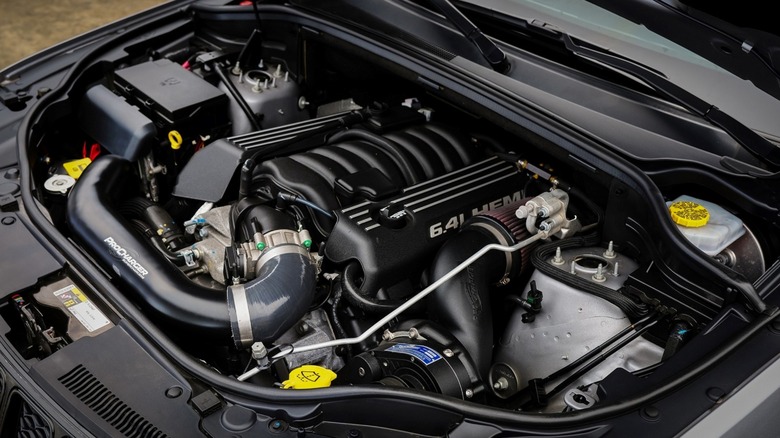
The Image Engine/Shutterstock
Engine bays are easy to ignore for many people. If you’re not a mechanic, and you don’t perform your own maintenance or repair work, you may never pop the hood to see the dirt and grime lurking beneath. But as easy as it is to forget about your engine bay, it’s important that you remind yourself to open it up occasionally to check a few things. When you pop the hood, you may notice that it’s pretty dirty under there. That’s relatively normal, as internal combustion engines get pretty messy as part of their normal operation. However, it still doesn’t hurt to clean your car’s engine bay every once in a while. Doing so may help prolong the life of things like belts and hoses, and it can make it easier to identify symbols and words on fluid caps and locate leaks and other damage.
Advertisement
Fortunately, there are some tricks you can use to prevent the accumulation of dirt and grime in your vehicle’s engine bay. As a former professional automotive mechanic and a lifelong car fanatic, I’ll break down a few simple methods you can use to keep your engine bay spotless. So, from performing routine maintenance to practicing safe driving habits, here are six tips for keeping your car’s engine bay showroom clean.
Keep up with routine maintenance
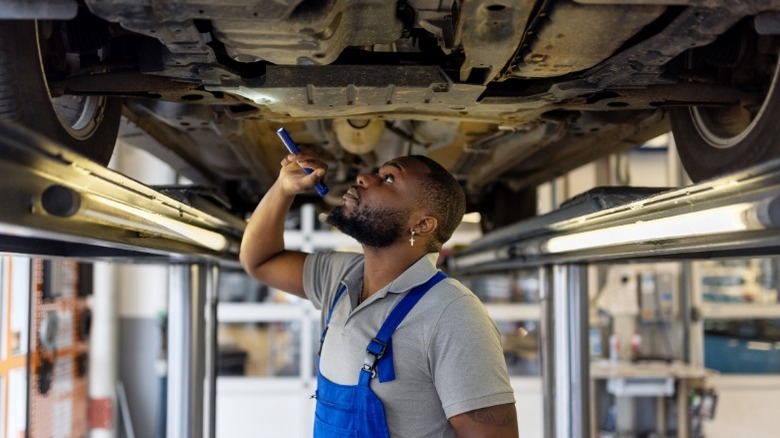
Luis Alvarez/Getty
Every vehicle requires routine maintenance. Your car’s engine and drivetrain can last for hundreds of thousands of miles, but only if you maintain them properly. However, performing regular maintenance isn’t only a great way to ensure that your engine stays healthy. It can also be a fantastic way to keep your engine bay and various other areas of the car looking clean and pristine.
Advertisement
First, performing routine maintenance provides us with a great opportunity to inspect components and clean up any obvious messes. Doing things like changing your car’s oil or replacing your engine air filter allows you to wipe up the top and bottom of the engine bay, clean up grease or residue, and check for leaks and damage. You can even spray the engine with a degreaser or just plain-old water after you finish your maintenance projects for a deeper clean.
The second way that performing maintenance helps keep the engine bay clean is by contributing to the prevention of future damage. Vehicle manufacturers provide us with maintenance schedules to help make our cars last for as long as possible. Performing regular maintenance like oil changes, coolant flushes, and air filter replacements can help prevent things like fluid leaks and other damage. Fluid leaks and engine issues aren’t only problematic because they can disrupt your life or leave you stranded — they can also cause a huge mess. Keeping up with routine maintenance is one of the best ways to avoid pesky mechanical issues while keeping your engine bay spotless.
Advertisement
Address leaks and mechanical problems quickly
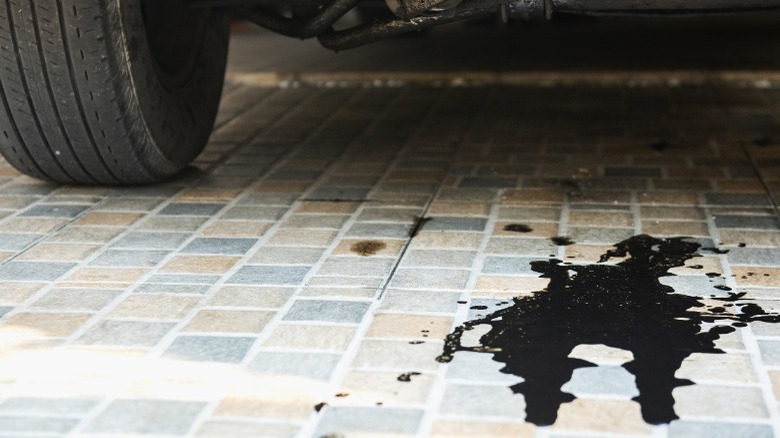
Undefined Undefined/Getty
Leaks are messy for various reasons, and the different types of fluids contained in your engine bay can form a recipe for disaster if they begin to leak. Petroleum-based fluids, like motor oil, hydraulic power steering fluid, and brake fluid, tend to attract dust and muck and leave behind thick grimy messes. Other fluids, like coolants, can crystallize and leave behind crusty masses that can be challenging to remove.
Advertisement
Mechanical problems that don’t cause leaks can be just as destructive — even if the issue doesn’t cause a fluid leak directly, it may cause damage and result in a dirty engine bay in other ways. For example, battery terminals can corrode, leaving behind toxic dust and residue, while CV axle boots can tear, slinging thick grease into your wheel wells and lower engine bay.
It’s important that you check your vehicle’s motor and the surrounding areas regularly to stay on top of issues like these. Doing so can help you avoid expensive repairs and can go a long way toward keeping your engine bay clean. If you do encounter a leak or a mechanical problem, you should fix it as soon as possible. Delaying the repair will only worsen the issue, and waiting to address the problem can make removing caked-on grease and grime much more difficult.
Advertisement
Modify with caution
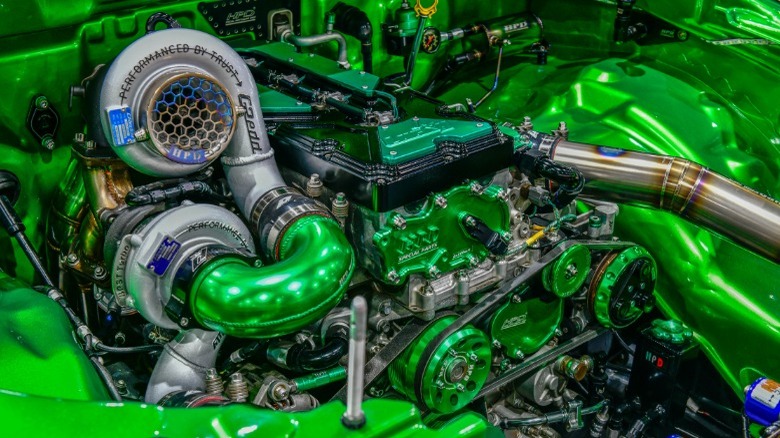
i viewfinder/Shutterstock
Modifying your car can be a great way to boost its performance. However, vehicle mods can come with their downsides, too. Purchasing the incorrect components or installing them improperly can result in engine damage or performance problems. It’s vital that you do your research and educate yourself before purchasing and installing aftermarket parts and add-ons for your car. You should also have a basic understanding of your vehicle’s engine and its capabilities. Installing equipment designed for higher power outputs than your car is capable of producing can cause severe damage, including broken internal engine parts and even suspension system damage.
Advertisement
If you plan to install aftermarket modifications on your car, you should exercise a bit of caution. Start small with things like air intakes, brakes, and tires. If you go overboard, engine damage isn’t the only thing you may have to worry about. As mentioned above, mechanical problems frequently cause messes. The same is true for defects and malfunctions caused by incorrectly-installed modifications.
For example, if you install your cold air intake improperly, it could suck up a lot of road dust and sling that debris into the engine bay. Alternatively, if you install a turbo kit and fail to route the oil lines correctly, you may cause an oil leak, resulting in a grimy mess under the hood. Even experienced tuners make mistakes. The best way to mod your car without causing damage is to go slow, thoroughly research the parts and installation process, and reach out to a pro if you hit a snag or aren’t confident in your abilities.
Advertisement
Drive sensibly, and hit the car wash after going off-road

Everyonephoto Studio/Shutterstock
Driving safely and sensibly is not only a great way to protect your car from damage and avoid accidents. It’s also a solid way to avoid creating a huge mess in your engine bay. That’s because, even though your engine bay is relatively shielded from outside elements and debris, it’s not a completely sealed space. However, it’s not always possible to avoid driving in sloppy weather or off-road. Even if your commute doesn’t require you to drive off-road, it may be an important hobby that you enjoy doing on the weekends. Fortunately, you don’t necessarily have to stop driving in messy conditions — you just need to take a few precautions and clean up properly afterward.
Advertisement
That means traversing puddles and patches of ice and snow slowly and cautiously. Practice safe driving tips when it’s raining, and avoid hot rodding your car around town. If you drive off-road or through large amounts of snow, ice, and road salt, you should prioritize washing your vehicle as often as possible. Doing so will not only help prevent the development of rust and corrosion, but it can also help keep your engine bay looking pristine, especially the lower parts that are more difficult to access from above.
Invest in some detailing tools
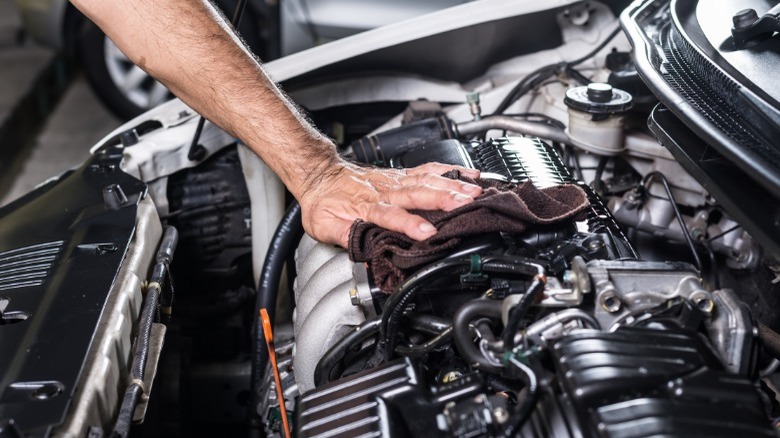
Bhakpong/Getty
Avoiding messes isn’t the only way to keep your engine bay clean. It’s also not a 100% fool-proof method. Even if we take all the precautions, messes can still happen, and it’s impossible to avoid dirt in all situations. That means that if you want to maintain a spotless engine bay, you’ll have to pop the hood and do some cleaning yourself. Unfortunately, it’s not always easy to clean your engine bay, or any other part of your vehicle for that matter. It’s easy enough to wipe down large flat surfaces and open areas. However, engine bays also contain a lot of hard-to-reach parts that you may struggle to clean with standard supplies.
Advertisement
Cleaning those spaces doesn’t have to be impossible, though. As is the case with many automotive jobs, having the proper tools can make everything easier. When it comes to detailing and cleaning small and hard-to-reach components, there isn’t a standard set of tools that you must have. Instead, it’s common to use whatever works best for you. Some people like to use things like old toothbrushes, Q-tips, and paper towels, while others prefer things like pick tools and repurposed firearm cleaning kits.
There are various tools that come in handy while detailing your car, but at the end of the day, it’s about finding the tools you feel most comfortable using. They don’t need to be fancy or expensive, and you might even already have some lying around. The important thing is that you gather a few tools to help you reach those tight spots, and then stick to a regular cleaning schedule to keep your engine bay looking showroom clean.
Advertisement
Learn how to perform your own maintenance and repairs
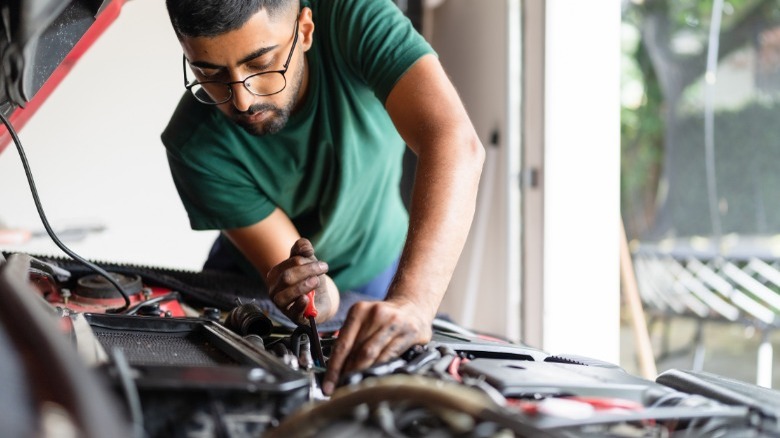
Asadnz/Getty
One of the best ways to keep your car’s engine bay clean is to learn how to perform your own automotive maintenance and repairs. We’ve already mentioned that keeping up with routine maintenance is one of the top ways to keep your engine bay spotless. While that remains true, if you pay a professional mechanic to service your car for you, they likely won’t have time to do much cleaning before moving on to the next project. Technicians will clean up any of their own messes caused by fluid spills or greasy finger smudges, but they won’t be able to go above and beyond like you can if you do the work yourself.
Advertisement
Learning how to work on your own vehicle allows you to familiarize yourself with the ins and outs of your engine bay. Once you understand the basics, the engine bay stops looking like a foreign puzzle and begins to look like an orderly, well-organized machine. Educating yourself and being able to identify various engine components also makes it easier and quicker to clean everything up. You’ll be able to identify leaks easier, and you’ll understand the difference between dirt caused by normal wear and tear and grime build-ups caused by leaks or mechanical malfunctions.
Finally, learning how to tackle your own DIY auto projects isn’t just a solid way to keep your engine bay clean. In reality, performing your own auto maintenance and repairs comes with many benefits, ranging from financial savings to increased confidence — not to mention that working on your own vehicle can also be a lot of fun.
Advertisement